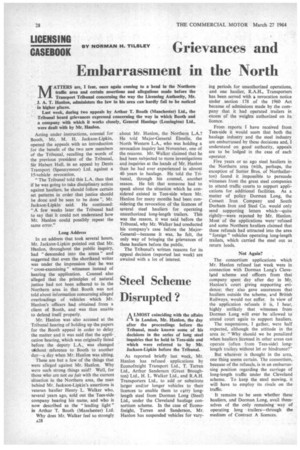LICENSING
Page 30

If you've noticed an error in this article please click here to report it so we can fix it.
CASEBOOK
BY NORMAN H. TILSLEY
Grievances and Embarrassment in the North
MATTERS are, I fear, once again coming to a head in the Northern traffic area and certain assertions and allegations made before the Transport Tribunal concerning the way the Licensing Authority, Mr. J. A. T. Hanlon, administers the law in his area can hardly fail to he noticed in higher places.
Last week, during two appeals by Arthur T. Booth (Manchester) Ltd., the Tribunal heard grievances expressed concerning the way in which Booth and a company with which it works closely, General Haulage (Lemington) Ltd., were dealt with by Mr. Hanlon.
Acting under instructions, counsel for Booth, Mr. M. H. Jackson-Lipkin, opened the appeals with an introduction for the benefit of the two new members of the Tribunal, recalling the words of the previous president of the Tribunal, Sir Hubert Hull, in an appeal by Dents Transport (Spennymoor) Ltd. against a 15-vehicle revocation.
'The Tribunal told this L.A. then that if he was going to take disciplinary action against hauliers, he should follow certain set patterns in order that justice should be done and be seen to be done ", Mr. Jackson-Lipkin said. He continued: "A few weeks later the Tribunal had to say that it could not understand how Mr. Hanlon could possibly repeat the same error."
Long Address In an address that took several hours, Mr. Jackson-Lipkin pointed out that Mr. Hanlon, throughout the public inquiry, had "descended into the arena" and suggested that even the shorthand writer was under the impression that he was " cross-examining" witnesses instead of hearing the application. Counsel also alleged that the principles of natural justice had not been adhered to in the Northern area in that Booth was not told about information concerning alleged overloadings of vehicles which Mr. Hanlon's officers had obtained from a client of Booth, and was thus unable to defend itself properly.
Mr. Hanlon was also accused at the Tribunal hearing of holding up the papers for the Booth appeal in order to delay the matter and it was said that the application hearing, which was originally listed before the deputy L.A., was changed Oithout reference to Booth to another day—a day when Mr. Hanlon was sitting.
These are but a few of the things that were alleged against Mr. Hanlon. Why were such strong things said? Well, for those who are not au fait with the current situation in the Northern area, the man behind Mr. Jackson-Lipkin's assertions is veteran haulier Henry L. Walker who, several years ago, sold out the Tees-side company bearing his name, and who is now described as the "leading light" in Arthur T. Booth (Manchester) Ltd.
Why does Mr. Walker feel so strongly A28 about Mr. Hanlon, the Northern L.A.? He told Major-General Elmslie. the North Western L.A., who was holding a revocation inquiry last November, one of the reasons. Mr. Walker claimed that he had been subjected to more investigations and inquiries at the hands of Mr. Hanlon than he had ever experienced in almost 40 years in haulage. He told the Tribunal, through his counsel, another reason. He felt that someone had to speak about the situation which he considered existed in Tees-side where Mr. Hanlon for many months had been considering the revocation of the licences of several steel hauliers for operating unauthorized long-length trailers. This was the reason, it was said before the Tribunal, why Mr. Walker had conducted his company's case before the MajorGeneral—because it was, he felt, the only way of bringing the grievances of these hauliers before the public.
The Tribunal's written reasons for its appeal decision (reported last week) are awaited with a lot of interest.




































































































